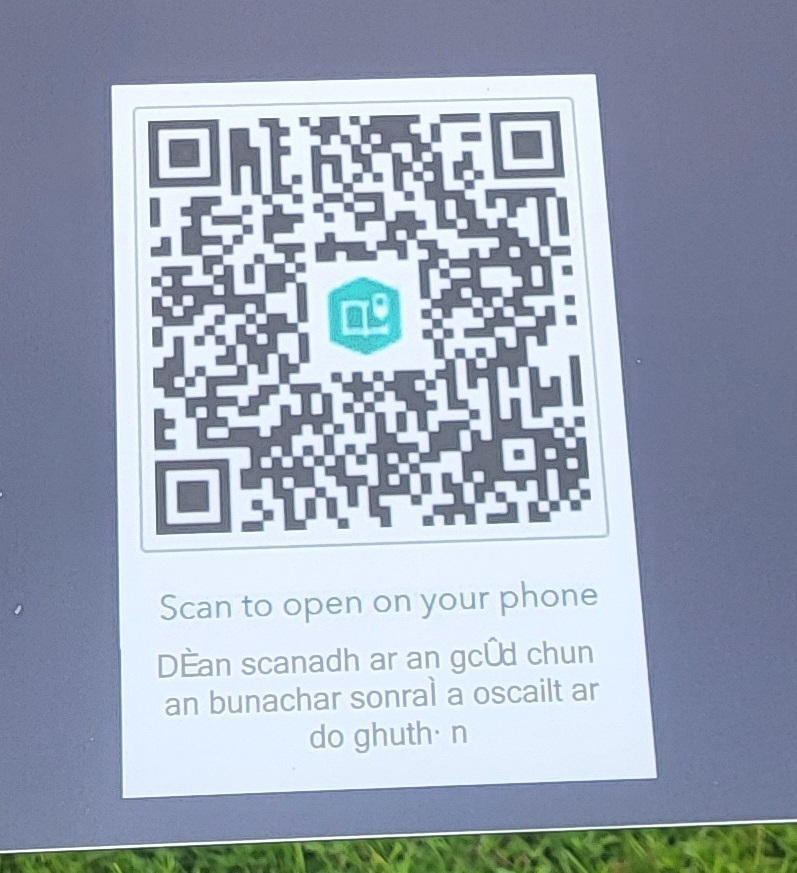
The sign at St Patrck's Cemetery at Dowdallshill
There has been over 12,000 visits to the online searchable database of burials at St Patrick’s Cemetery in Dundalk since its official launch last December, a number that is expected to increase significantly now, following the recent erection of a sign at the graveyard with a QR code that leads to the graveyard database.
The project has been led from the start by Jim Kerley, a committee member of the Old Dundalk Society. If a stranger arrives to St Patrick's Cemetery and goes to the sign, they just hold it up to the QR code and that will bring them straight into the site, which Jim explains, is “basically a map of the graveyard”. Once in the site, users can view the different sections of the graveyard.

Above: the QR code that will bring users to the database
There has been visitors to the site from all over the world since its launch, “from as far away as China”, Jim reveals.
“Naturally enough we expected [visits from] Ireland and England, Canada, Australia”, he continues, “but we got Germany, Finland, Greece.
“I think maybe people go on their holidays, they have long lost relatives, 'I want to see where Granny is buried', they decide. It's also great for tourism – I mean families coming home. Coming home for their family trees. “'When I go to Ireland this time I want to visit so and so', and what used to happen was”, he continued, “they would spend more time going round the different churches, or going around the different libraries, or whatever, trying to get the information [about their families]”.
“Now they come, and the minute they hit Dundalk, 'we're going out to see Granny's grave', and now they can find out who all is in it. Up to now, you go to Granny's grave and there is, for instance, it just says Kerley family, how do they know who is in it?
“Now they'll be able to tell. And an awful lot of the headstones don't have all the information on it, such as 'Granny had two more children that died young'. If they're recorded as being buried, they're now in the database. So it opens up an awful lot.”
The records for each grave contain information including, name, age, occupation, martial status, dates of death, and burial.
As someone who is interested in genealogy and found it a labour of love, it was still a mammoth, nine year task to complete the database and launch it online for the public.
The information in the database goes up to 2020. “There's a five year sensitivity clause, so if someone died last year, they're not in it for five years - for sensitivity, we can understand. We've withheld the address for 30 years, that's more to do with identity theft.”
There was 400 hits to the website during the first week after the sign was erected at the graveyard, Jim revealed, “it really is a massive success”.
“And thanks to everybody that helped”, Jim added, including “the volunteers who helped transcribe (the data), DkIT for us giving the students early on, to see could we build the app and the database, Helen Dibley and Francis Monaghan in Louth County Council, they did trojan work.”
The database is very easy to access and navigate. The QR code brings users straight into the database, but you can also access it by visiting www.louthcoco.ie, going to the Services section, and then Archives, and then St Patrick's Cemetery Database.
Subscribe or register today to discover more from DonegalLive.ie
Buy the e-paper of the Donegal Democrat, Donegal People's Press, Donegal Post and Inish Times here for instant access to Donegal's premier news titles.
Keep up with the latest news from Donegal with our daily newsletter featuring the most important stories of the day delivered to your inbox every evening at 5pm.